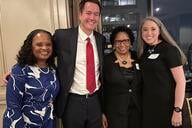You have /5 articles left.
Sign up for a free account or log in.
As I conclude my fourth month as president of the Council for Advancement and Support of Education, I find that I have made an important discovery: the words my colleagues around the world use to describe our shared work are not global.
In particular, the term “advancement”—perhaps the most basic term in our shared vocabulary—lacks a clearly shared definition. The membership and leadership of CASE describe differently which disciplines and practitioners are included under that umbrella. With conflicting understandings of what advancement is and isn’t among our 81,000 members worldwide, it is important that we agree on a solid, concise definition of “advancement” within an education context.
And so, I argue that we should define advancement as the collective effort of professionals across multiple disciplines to address the profound issues facing education and ensure the long-term health of our institutions and industry.
History of CASE
This precise definition of advancement is tied to the history of how CASE became the home for such different, yet intertwined, disciplines. The CASE articles of incorporation were signed on Nov. 26, 1974, with the merging of the American College Public Relations Association and the American Alumni Council. Note that a mere 40 years ago, CASE had no background in fundraising.
In 1980, CASE grew to include philanthropy, expanding the scope and classifications of its membership. In 1993, CASE reduced its nine commissions and focus areas to three: alumni relations, communications and philanthropy. Elements of the other six topic areas, including government relations and student recruitment, were collapsed into these three content areas to support their broader themes. This represents the "three-legged stool" concept of advancement, which has been present in the discipline for a long time and is reinforced within CASE's organizational structure and our strategic vision.
We opened CASE Europe offices in 1994, CASE Asia-Pacific in 2007 and CASE América Latina in 2011, because we understand that higher education’s reach is global and CASE represents everyone who works to advance education across the world. Our CASE Africa program has been running since 2003. The practical linking of our professions day-to-day is what CASE does.
Institutional Advancement
Our work isn’t just about raising money—it is about engaging leaders in the process of building relationships to engage communities and advance institutions. Advancement professionals do just that and do so together. Opportunities to work collaboratively across disciplines and, ignoring any potential artificial divisions created by organizational charts, provide the greatest impact of our work for our campuses among our most valued audiences. Whether issuing a call to action, asking for monetary or political support or making the case for students to enroll, we collectively advance global education.
CASE members represent the heart and soul of that which drives the mission of an institution. We tease out what is most relevant and impactful when dealing with internal complexity and external relationship building, and our members provide partnerships and resources to expand all sources of funds in today’s challenging fiscal landscape. And in return, CASE provides knowledge and wisdom when campus politics, media crises or challenging finances loom large; offers a place for creative collaboration with peers; and seeks to provide resources equitably across all member disciplines. We support our members in building effective programs to support their institutions.
Why CASE Matters
It is critically important for us to describe to the greater academic community what CASE is and why it is important. We often receive feedback from presidents and other cabinet-level colleagues that we are viewed as the association for fundraisers. This is a dangerous omission for our colleagues in alumni relations, marketing and communications, as it underestimates the vitality of collaboration and limits the fiscal and reputational health of our institutions to endowments and campaigns.
And this omission is also tone-deaf to the realities of higher education. We represent nearly 3,700 colleges and universities, primary and secondary independent and international schools, and nonprofit organizations in over 80 countries, which means we are contributing to a worldwide movement that prioritizes education. In the United States, we hear of private colleges on the brink. In Australia, we are adjusting to reductions in national support of public education. In the European Union, we grapple with scaled-back research funds. No matter the continent or the issue, it is clear there has never been a greater need for advocating for our long-term health.
While we use different words to describe our professions and our efforts—my colleagues in the United States prefer to be called fundraisers while in the United Kingdom that title can be seen as akin to a panhandler—I say we must reclaim the term “advancement” to include its broadest intent.
Across the globe, the future of higher education funding is predicated on the ability to recruit and graduate students and engage the general public in supporting our efforts to significantly increase degree attainment.
This weekend, we convene the CASE Summit for Leaders in Advancement, which is our annual United States-based reflection on how our multiple disciplines knit together to make education’s future stronger. We will include perspectives from among our three-legged stool of professionals and discuss vitally important topics, including our industry’s ailing funding model and alternatives to current thinking about education. We look forward to hosting our colleagues and charging them with sharing what they learn with their home institutions. After all, that dissemination, too, reflects the core of advancement.
Sue Cunningham is president of the Council for Advancement and Support of Education.




